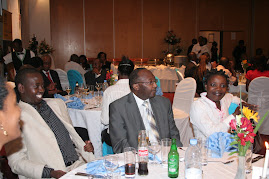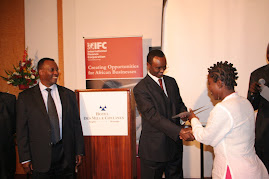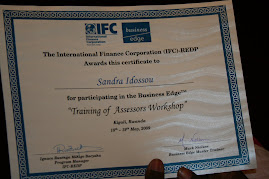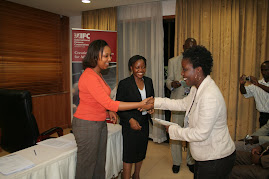
http://newtimes.co.rw/index.php?issue=14336&article=4075&week=30
Consulting & Training for Service Providing Companies

It’s 6.20 pm this Saturday afternoon and I am sitting at the Amahoro Stadium waiting for an event I have come to attend to begin. Much as I love the good music being played and the festive atmosphere at this moment , I never thought that I will sit just like this for more than two hours without any hint that the cultural event is about to start.
I have been here since 4.00 pm in the afternoon as stipulated on the program for the opening ceremony of this FESPAD event. For those who do not know FESPAD this is the Pan-African Dancing Festival that is organized every two years in Rwanda.
It attracts many cultural groups from different parts of the world. This edition has more than eleven countries participating and many international media covering it.
For the past two hours, all we have seen are people still testing their microphones and setting up the place. There have been some young people wearing green sitting on the floor and in the sun for the last two hours waiting also for the event to kick off.
But thinking again about this, I wonder why events such as these never start on time. Well, if you are a frequent reader of this column, you surely know by now that your columnist has issues about people not respecting time. Time is so precious that I hate to have to waste it.
Friends keep on telling me to “relax” because we are in Africabut I must admit that I can’t get used to this idea. Someone jokingly also told me that Africans wear the most expensive and branded watches yet they fail to look at the time. And this is true.
This issue of time respect is a serious one that affects all areas of our lives. Most public meetings, workshops, seminars, weddings, receptions, and even government conferences start late. It has become a common practice to never start on time and the unfortunate part of it is that this seems to be accepted by everyone.
In one of these big meetings last time, the MC kept on saying that they were waiting for the Guest of honor to show up. In some other cases; it is when people are already seated that the stage or the room are being fixed and decorated.
By the way, I always wonder why the technical aspects of events are not taken care of a day prior to these events. In this stadium now, there is this person who has been saying for the past thirty minutes “one, two, mic testing”.
If he knew he needed to test the microphones, why couldn’t he
do that before guests arrive?
Dear reader, I am begging you in the name of God to consider the time of the people you have invited. Do make sure that you plan things ahead of time so as to avoid doing things at the last minute. Also, when you are invited, please try to respect the time so that people who come on time will not be punished by waiting for you.
Well; it’s now 6.50 PM and nothing has still started. I am thirsty and there is nowhere one can buy water. The excitement for this event is gradually fading away.
Customer service requires that even cultural events starts on time. Customer service is also the preparedness in organising all events may they be business, cultural or social. It is simply the respect we show to people we have invited to our events.
In recently met a potential investor of the Service Mag, who was in complete doubt about service improvement in Rwanda. He gave several examples and concluded by saying; “Why should we be the ones offering the magazines to the public? Do you really think there is any change happening? I have ended up believing those who say that poor customer service is just in our culture.”
There is no need to say here that I found his arguments thought-provoking. Not because this was the first time I was hearing such comments about service delivery in Rwanda but because of the nature of the arguments.
Well, though your columnist is not Rwandan, she refuses to believe that poor service is a matter of culture. I have come to realize that many people hide behind the arguments of culture to continue delivering or accepting poor service.
We can all admit that there are still issues about service delivery. We still experience long queues in banks, slow service in most administrations, the lack of consideration from many service providers but yes; service today is still better, in most cases, than it used to be before.
There is a change process going on today. It might not be very visible but it is there. Let’s understand that change is a progressive thing. Change does not happen just in a twinkle of an eye. Change needs time and perseverance.
Some habits have a powerful role in our lives. If we want to improve on our habits, we need Knowledge, Skills and Desire.
a) Knowledge
This allows us to know what to do. And it is for this reason that change needs a lot of education. People need to understand what they gain in offering good service. Knowledge is actually what helps the service provider to understand that it is for his/her own benefit to offer good service.
b) Skills
After Knowledge; one needs Skills to improve on one’s habits. Skills give us the ability to know how to do certain things. Again; education becomes an important element needed in acquiring new skills.
c) Desire
The Desire is the motivation to do certain things. In every change of habit, we need to have a real motivation. We need to see the end result. What do we gain when we change that poor habit? What are the advantages of that change we want to do? Change starts from within so look at the final result you want to achieve before you even start the change process.
Changing habit will require that we repeat the new habit each day. If we do not succeed the first day, it doesn’t matter. All we need to do is to continue the next day until, we adopt those new habits.
“The best way to hide something from Black people is to put it in a book. We now live in the Information Age. They have gained the opportunity to
read any book on any subject through the efforts of their fight for freedom, yet they refuse to read. There are numerous books readily available, but few read consistently, if at all”.
This is just a small portion of a long letter that was read on a New York radio station some time ago by a Caucasian white man. The title was “Blacks don’t re
ad: They are still our slaves”.
The first time I read this on internet, I got very infur
iated by the discriminatory opinions of the writer but with a second thought, I realized that he had a valid point. Many people, especially blacks are ignorant on many issues because they do not read. This is pathetic but sadly true.
Let’s be frank to one another dear readers. When was the last time you read a book? How many of us read today at least one book in a month? Do you have a budget for books or any other reading materials?
I come from a country where it is so common to see every morning people grouped in front of newspaper vendors to be able to catch a glimpse of at least the headlines of the numerous newspapers of the day.
It is even so common to see people walkin
g around town with a newspaper with them. In buses, hair salons, waiting areas in offices etc, it is often that you see people reading.
I must admit that this is something your columnist doesn’t’ often see here. The last time I talked to a friend concerning one interesting article in The New Times, her answer shocked me;
“You know what Sandra, when I receive every morning this newspaper, I just glanced through the titles and look for tenders that might be interesting for my business; I do not really read the articles.”
We can all recognize that the general message in the above sarcastic description of the black community is thought-provoking as reading is considered in most cases as a mere primary leisure activity. I am an African and I know that in our culture, we communicate primarily by oral means.

We rather place value on what people say or on what we hear rather than what we find out through print. As a result, we lose sight on the value of reading and getting information by ourselves.
The tragedy today is that, many people especially Africans have no passion to read. In today’s world we receive so much information via radio, television and multimedia experiences yet none of these avenues has the ability to educate as the fundamental skill of reading.

Reading has many advantages. Reading helps to travel to lands far away in the minds of readers. Reading helps to open up to other cultures. Thanks to technology today, we can read and travel a lot through reading via internet.
With my new phone for instance, I have the impression that I have access to every information in real time in my hands. Just a small click and the answer to my curiosity is right there in my hands. I often say that with Google today, we have no excuse of being ignorant.
Even in these days of multimedia, reading is the most essential skill to acquire knowledge. The internet has made information to be freely available to anyone who can log on. With the advent of websites and e-books, reading should be an easy and simple activity for everyone.
Reading helps in mental development and is known to stimulate the brains. It is often advisable to indulge in at least half an hour of reading a day to keep abreast of information.
For instance, it is observed that children who read have comparatively higher IQs. They are more creative and do better in school. It is for this reason that it is recommended that parents inculcate the importance of reading to their children in the early years.
Dear readers, if you don’t read you are definitely missing out on a great way of learning as well as a wonderful way of improving your life and business. Books, newspapers, magazines, internet can instruct, inform, entertain, motivate and inspire.
One of the most basic foundations of power in business comes from knowing information and controlling it. Develop the habit of reading. Resolve to never let a day go by without reading something and you will see the effect on your knowledge building.
Remember knowledge is power!
The author is a customer service consultant working in Rwanda.
http://newtimes.co.rw/index.php?issue=14319&article=3945&week=28
By Sandra idossou


I am a happy consumer since July 1, 2010 as Rwanda together with the other four East African Countries embarked on the Common Market Protocol. This means that competition is going to be available almost on all sectors of business.
Kenya, Uganda, Tanzania, Burundi and Rwanda have all opened up their markets to each other and this brings us joy here in Rwanda. Joy in the sense that this Common Market Protocol will bring free movement of labor, capital, goods and services within the region.
What I love about the Common Market is that it will also avail greater opportunities for trade in goods and services; opportunities for greater competition; employment opportunities for people in the East African Community member states.
Well, this is great news for us as customers as we will have more choices. We will not have to stick to the poor service provider we are used to because we have no alternative.
This is the time business owners in Rwanda have to wake up, especially those who were still sleeping or thinking that they were the best in town. It is time to adopt ways of offering exceptional customer service that will make their customers stick to them even when competition arises.
In times like these when competition becomes tougher, as a business owner, you will need to offer more than what others do. You will have to be “better” than your next door competitor.
Competition should have positive effects on innovation. In today’s technology-driven world, innovation is crucial to success. Today, more than ever, as a business owner, you need to become more innovative to develop new products and new services that will best meet the expectations of customers.
Competition has a positive impact, not only on the well being of consumers, but also on a country’s economy as a whole. Competition today should bolster the productivity and international competitiveness of the business sector and promotes dynamic markets and economic growth.
I love the competition that the Common Market is bringing in Rwanda because it will help improve on customer service. Customer service is all about making a customer satisfied enough that they will remain loyal even when competition arises.
For example since cost of fuel is the same at Engen, Merez and Kobil, what makes customers chose one petrol station over others is the “little extra thing” such as the warmth of the attendant, smile and professionalism and the fact that they may clean your car windscreen etc.
These are the little details that will make the difference among competitors.
“In the struggle for survival, the fittest win out at the expense of their rivals because they succeed in adapting themselves best to their environment” says Charles Darwin.

As a business owner, when there is real competition, you need to go round your competitors and know what they are offering. This helps you offer more than they do. You need to look for gaps in their services so that you can fill them.
Be an answer to the loopholes. Bringing your prices lo
wer when there is competition doesn’t always make the customer stick to you. Rather make sure your products/services are worth the prices your customers are paying.

When I go to a “4 star” hotel like Laico for instance where I pay Rwf15,000 for lunch; the services I am expecting as a customer should be worth the money I’m paying.
The service I receive should differ from what I could receive at Karibu Restaurant where I pay Rwf2,500 for almost the same quality of food. I should not be yelling on top of my voice to have the attention of the waiter who is at the corner of the counter chatting with his colleagues.
In times of tough competition, there’s no real secret in getting your customers stick to your business. All you need to do is provide customer service that exceeds your customers’ expectations and outshines your competitors’ customer service.
As a consumer, I sincerely hope that competition will have
a positive effect on businesses’ efficiency and productivity. Companies that are faced with vigorous competition are continually pressed to become more efficient and more productive.
“Competition is always a fantastic thing, we’ve got so
me fantastic competitors and it keeps us on our toes” says Bill Gates.
The author is a customer service consultant working in Rwanda.
















